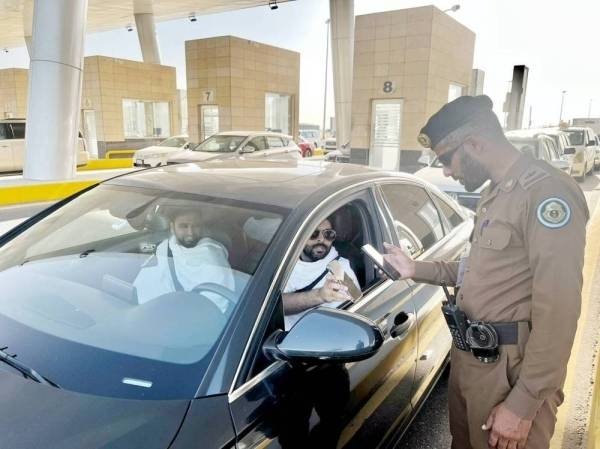Saudi authorities have launched an intense crackdown in 2025 to stop illegal Hajj entry. As the Hajj season begins, the Kingdom is taking strong steps to make sure that only those with official permits are allowed to take part in this holy pilgrimage. The aim is to protect pilgrims, ensure smooth operations, and maintain order during this important Islamic event.
The illegal Hajj entry crackdown is a key part of Saudi Arabia’s wider efforts to organize Hajj safely and efficiently for millions of Muslims arriving from around the world.
Why Saudi Arabia Is Cracking Down on Illegal Hajj Entry
The Hajj is one of the world’s largest religious gatherings. It draws more than 2 million pilgrims to Mecca each year. Managing this crowd is a huge task that needs strong planning, security, and crowd control.

However, some people try to bypass the system and enter Mecca illegally. This includes local residents without permits, foreigners overstaying visas, and others using fake documents. These actions can:
- Lead to overcrowding in sacred places
- Disrupt organized movements of pilgrims
- Increase risks of stampedes or other safety concerns
- Put pressure on health services and infrastructure
To prevent these risks, Saudi Arabia has made it clear that illegal entry during Hajj will not be tolerated.
How Saudi Authorities Are Enforcing the Crackdown
This year, the Saudi Ministry of Interior, Ministry of Hajj and Umrah, and security agencies are working together to ensure tight control across all access points. Their strategy includes:
Increased Checkpoints
More than 20 major checkpoints have been set up around Mecca. Security personnel at these points are checking every vehicle and person entering the city to ensure they have valid Hajj permits.
Use of Surveillance and AI Technology
Advanced technologies are playing a big role in the crackdown. Authorities are using:
- CCTV cameras with facial recognition in high-traffic areas
- Drones for aerial monitoring of illegal entry routes
- Smart ID scanners to verify pilgrim identities
- AI-powered analytics to detect suspicious travel patterns
These technologies help officers identify illegal attempts quickly and respond in real-time.
Border Patrols and Special Task Forces
Special teams have been deployed along the borders and near key roads leading to the holy cities. They are trained to detect smuggling operations, catch unauthorized pilgrims, and assist in managing the crowd effectively.
Penalties for Illegal Hajj Entry
Saudi authorities have announced serious penalties for those who try to enter without official permits. These include:
- A fine of up to SAR 10,000 (approx. $2,700 USD)
- Immediate deportation for foreign nationals
- A ban from entering Saudi Arabia for up to 10 years
- Jail sentences in some cases for organizers or repeat offenders
In 2024, more than 100,000 people were reportedly turned away at checkpoints for not having valid Hajj permits. This year, officials have warned that enforcement will be even stricter.
Fake Permit Scams Are Also Being Targeted

Illegal Hajj entry is sometimes made possible by fraudulent agents who offer fake permits to pilgrims desperate to attend. Saudi authorities, in coordination with foreign governments, are tracking and shutting down these operations.
People have been advised not to trust unlicensed agents and to register for Hajj only through official government-approved channels.
Impact on Pilgrims and Local Communities
Most pilgrims welcome the crackdown because it makes the Hajj safer and better organized. Legal pilgrims benefit from better services, shorter waiting times, and easier movement through religious sites.
However, the rules have also drawn criticism from those who find the permit process difficult. Some local residents, especially undocumented workers living in Saudi Arabia, have traditionally tried to attend Hajj without permission. But the government now stresses that safety must come first.
Hajj 2025: A High-Tech, High-Security Operation
Saudi Arabia has been upgrading its Hajj systems over the past decade. The Kingdom is investing heavily in smart technology to monitor, manage, and enhance the pilgrimage experience.
Some key innovations in Hajj 2025 include:
- Digital Hajj permits linked to biometric IDs
- Real-time pilgrim tracking through mobile apps
- AI-controlled crowd management systems in the Grand Mosque
- E-gates for faster entry and exit at Hajj terminals
These tools are helping the country move closer to its Vision 2030 goal of becoming a global leader in tech-powered pilgrimage services.
International Cooperation to Stop Illegal Hajj Entry
The Saudi government is also working closely with foreign countries to stop illegal Hajj entry at the source. This includes:
- Educating citizens on how to apply for legal Hajj
- Sending out travel warnings about illegal operators
- Coordinating airport checks with other governments
- Creating digital verification systems for Hajj agencies
In many countries, such as Indonesia, Pakistan, Egypt, and India, local Hajj boards have launched campaigns to warn people against using unapproved agents.
Saudi embassies around the world have also increased efforts to make sure that visa rules are clear and enforced.
Religious and Community Leaders Support the Crackdown

Many religious scholars and community leaders have spoken out in support of the crackdown, reminding Muslims that Hajj is not obligatory unless they are physically and financially able to go legally.
Islamic teachings emphasize that safety, order, and respecting the law are essential parts of the Hajj journey. Leaders have advised worshippers to wait their turn and avoid shortcuts that could put themselves or others at risk.
Tips for a Safe and Legal Hajj Journey
For those planning to perform Hajj in 2025 or future years, here are some tips to ensure you stay safe and within the law:
- Apply for Hajj only through approved government agencies or authorized travel operators
- Avoid anyone promising “shortcuts” or quick permits for extra money
- Check your permit and visa status using official platforms like the Nusuk app or Ministry of Hajj website
- Keep digital and paper copies of all your documents during your travel
- Be respectful and cooperative at security checkpoints
By following these steps, pilgrims can avoid trouble and enjoy their spiritual journey in peace.
Conclusion: A Safer Hajj Experience for All
The illegal Hajj entry crackdown is part of a bigger mission to make the pilgrimage safe, organized, and meaningful for every participant. Saudi Arabia’s strong security measures, use of smart technologies, and international partnerships all play a role in achieving this goal.
While the rules may seem strict, they are designed to protect the spiritual and physical well-being of millions of people who dream of performing Hajj. In 2025, as the crackdown gets tougher, pilgrims are reminded that true devotion also means respecting the law.
By choosing the legal path, worshippers not only fulfill a religious duty but also help create a safer, more respectful experience for everyone.
Do follow UAE Stories on Instagram
Read More: The Ultimate Dining Guide to the New Bluewaters Island













